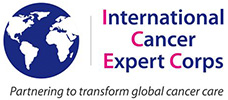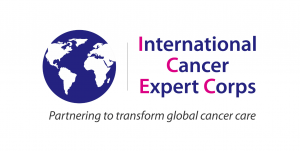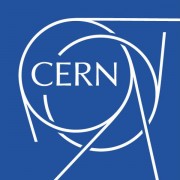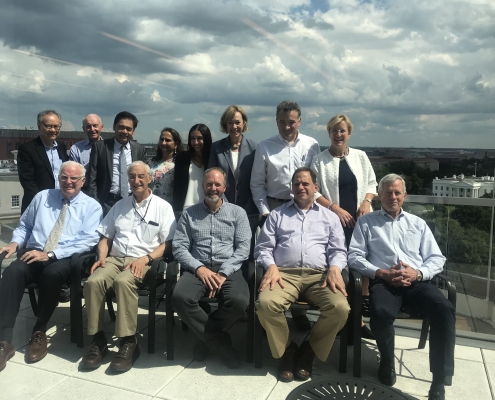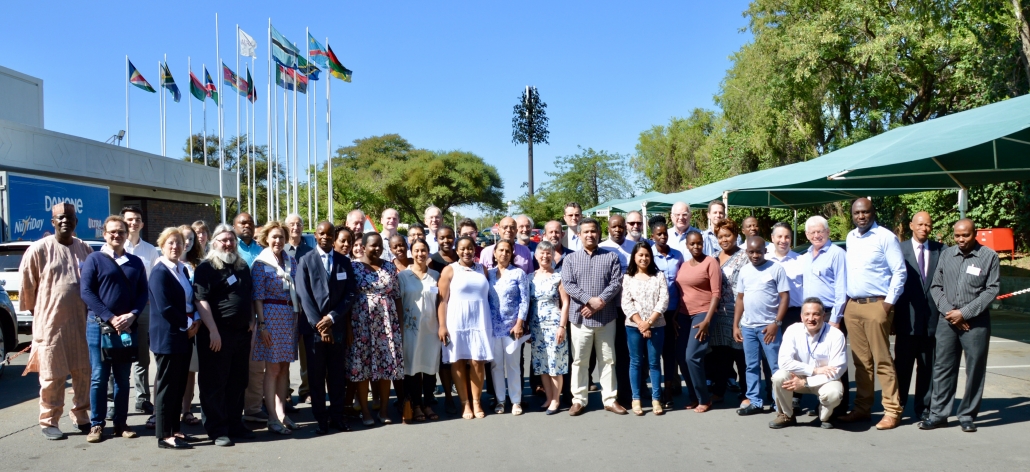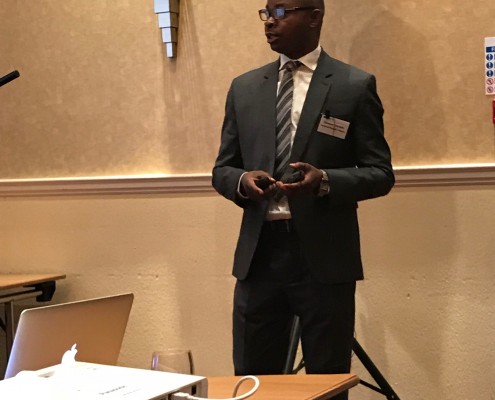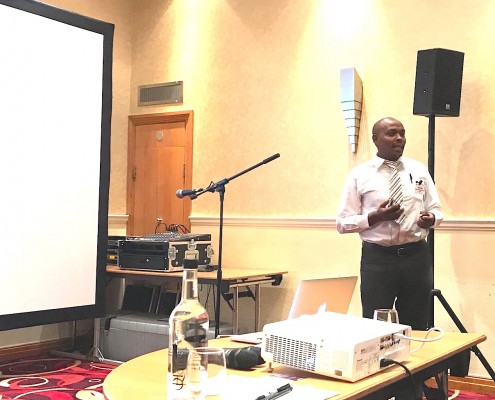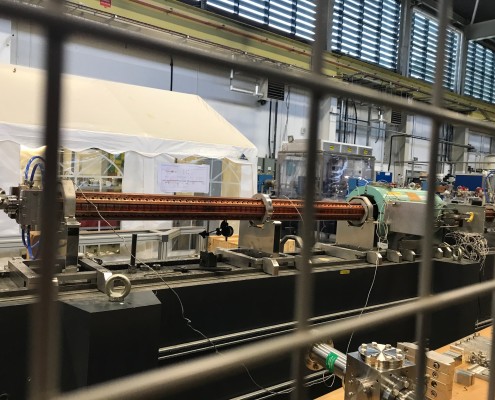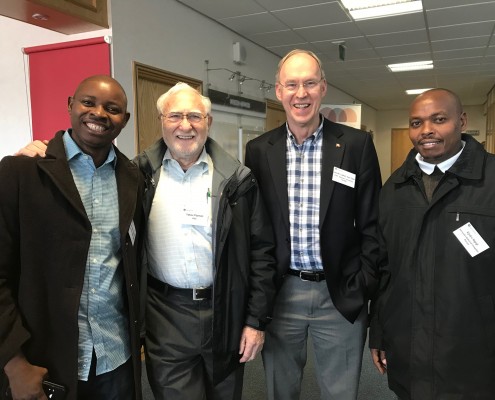The need for robust, first-rate radiation treatment systems capable of functioning in the challenging environments encountered in many developing countries is a well-recognized global need. ICEC is addressing this issue through the development and implementation of creative and innovative ideas. This multi-year program has benefited from the support of CERN, STFC (UK) and many other committed individuals who are interested in providing radiotherapy to those without current access to radiation therapy equipment.
Washington, DC USA
July 24-25, 2019
Advancing the Design of a Robust and Affordable Radiation Therapy Treatment System for Challenging Environments
Washington, DC was the location of the 5th workshop to advance the design of an affordable and robust, yet technically sophisticated linear accelerator-based radiation therapy treatment (RTT) system. The meeting was hosted by the International Cancer Expert Corps (ICEC) and included participants from the STFC Daresbury Laboratory, CERN, Lancaster University (UK), Kings College London Institute of Cancer Policy, Oxford University (UK) and Melbourne University (AU), and ICEC and its Scientific Advisors.
Building on the input from prior workshops and design sessions at the recent meeting in Botswana (March 2019), a core team of physicists, radiation oncologists, and health systems experts convened to further re-fine design decisions and planning for a new LINAC. The agenda had presentations and discussion on topics that included:
- An overview of the developing science and future implications for Radiation Therapy
- A discussion on the clinical functional requirements for a radiation treatment system designed for challenging environments
- Refinement of the design elements for the LINAC
- A review of trends in cancer treatment and payment, and healthcare system priorities and challenges in both UICs and LMICs
- Opportunities to support a sustainable skilled workforce, for both treatment applications, and service and maintenance requirements in LMICs, through the development of ongoing education and training programs
Key decisions on many elements of the proposed system were made amongst the group. The initiative is rooted in developing a systems solution for improving cancer treatment in LMICs, an organizing theme for all of the workshops. To ensure that the needs and barriers are understood, a survey was designed for distribution to cancer programs in LMICs to gather more specific information on servicing challenges and down-time. This survey builds on a failure mode analysis that is being conducted in parallel. Ongoing education, training and mentoring programs will be an integral component of the planning for the new LINAC, so each workshop includes a discussion on how these needs are best met and funded.
The workshop concluded with a summary of progress, priorities to be addressed, a proposed timeline, and next steps.
This project continues to inspire leading physicists, physicians, and healthcare management and health policy professionals to use their expertise to expand access to radiation therapy for those most in need. With only 10 % of patients in low-income countries who need radiotherapy having access to this treatment, this project is critically important for improving cancer care. Read more from the Enlight Highlights article.
Advancing the Design of a Robust and Affordable Radiation Therapy Treatment System for Challenging Environments. (2019, December). Retrieved from https://enlight.web.cern.ch/sites/enlight.web.cern.ch/files/media/downloads/december_2019.pdf
Gaborone, Botswana
March 20-22, 2019
Accelerating the Future: Designing a Robust and Affordable Radiation Therapy TREATMENT SYSTEM for Challenging Environments
The 4th Conference to coordinate efforts to design and develop an affordable and robust yet technically sophisticated linear accelerator based radiation therapy treatment (RTT) system was held in Gaborone, Botswana on March 20-22, 2019. The conference was sponsored by STFC with funding from the UK Global Challenges Research Fund (GCRF) and supported by CERN and ICEC.
All too often, conferences related to creating a new program or technology to improve the care of patients with cancer or other conditions in LMIC’s and underserved regions of UIC countries are held in major world cities; New York, Geneva, London. Convening this conference in Gaborone enabled a significant number (over one half of the attendees) of physicians, physicists and staff from Sub-Sahara Africa and other LMICs to attend, present their re-ports and interact with the scientists working with them in their own region of the world thereby generating a sense of a global community working to-ward a common goal. It also allowed participants to visit hospitals, both private and public, in Gaborone to see the conditions under which the robust and modular RTT system will be used. The visiting participants left Gaborone with a much better under-standing of the challenges faced by those treating patients with cancer in LMICs and a much stronger commitment to work with their colleagues to develop the new RTT systems that they need.
This workshop built upon two prior workshops held at CERN in November 2016 and October 2017, and one in Manchester UK in March 2018. LMIC countries with participating representatives included: Botswana, Ghana, Jordan, Kenya, Nepal, Nigeria, Tanzania, Zambia, and Zimbabwe. Expertise included accelerator and medical physicists, engineers, oncologists, and healthcare management representatives. Read more…
Manchester, England
March 22-23, 2018
CERN, ICEC and the UK Science and Technology Facilities Council (STFC)
“Burying the Complexity: Re-Engineering for the Next Generation of Medical Linear Accelerators for Use in Challenging Environments”
ICEC, CERN and STFC, who was sponsor and host, held a workshop near the UK Daresbury Laboratory on March 22-23, 2018. The progress of the work packages assigned from the October 2017 meeting was reported and the work packages, as well as productive ideas presented at the workshop, will be incorporated into a comprehensive technology proposal to further develop novel linear accelerators for challenging environments. The proposal will be submitted to the UK Global Challenges Research Fund Foundation for further funding.
The five work packages were as follows:
1. Linear accelerator simulations for the stable and sustainable operation of developing country radiotherapy linear accelerators (PIs: Stewart Boogert and Marco Carlone).
2. Accelerator technology options study (PIs: Peter McIntosh and Alan Wheelhouse).Cloud-based Electronic Infrastructure in Support of Linac-based
3. Radiotherapy in Challenging Environments (PIs: Ajay Aggarwal and Jatinder Palta)
4. Robust Permanent Magnet Beam Delivery Systems for Medical Radiotherapy Linacs (PIs: Suzanne Sheehy and Ivan Konoplev)
5. RF Power Systems and Optimized RF Structures for Electron Beam Acceleration (PIs: Ivan Konoplev and Suzanne Sheehy).
Geneva, Switzerland
October 26-27, 2017
ICEC, CERN and the UK Science and Technology Facilities Council (STFC)
“Innovative, robust and affordable medical linear accelerators for challenging environments”
The need for robust, first-rate radiation treatment systems capable of functioning in the challenging environments encountered in many developing countries is another well-recognized global need. ICEC’s program that addresses this challenge is the lower arrow in figure 1. This topic was the subject of an ICEC-sponsored, CERN-hosted workshop held at CERN in November 2016. An overview of the workshop is available on our website and in the CERN Courier (https://cerncourier.com/cws/article/cern/67710). Publication of a detailed report of the 2016 workshop is under review and a report of the 2017 workshop is in preparation.
The follow-up workshop at CERN in October 2017 was entitled “Innovative, robust and affordable medical linear accelerators for challenging environments”. The event was a collaboration between CERN, ICEC and the UK Science and Technology Facilities Council (STFC) and was organized by Manjit Dosanjh and Paul Collier, Norman Coleman and David Pistenmaa, and Charlotte Jamieson, respectively. About 50 participants including physicians and physicists from five UK Official Development Assistance (ODA) countries (Botswana, Ghana, Jordan, Nigeria and Tanzania) met to further define the equipment needs in LMICs and to build a strategy for increasing access to radiotherapy for a larger number of people by developing novel, innovative, robust and affordable medical linear accelerators for the treatment of patients with cancer in challenging environments. STFC established an immediate objective to develop 5 work packages involving ODA countries that corresponded to the technical sessions of the workshop.
ICEC and the European Organization for Nuclear Research (CERN)
ICEC Sponsored and CERN hosted Workshop on Design Characteristics of a Novel Linear Accelerator for Challenging Environments – Improving global access to radiation therapy
Geneva, Switzerland
November 7-8, 2016
The first of its kind workshop regarding the need for radiation therapy education and training for a workforce to be able to safely use innovative linear accelerator technology was held at the European Organization for Nuclear Research, more readily identified as CERN, in Geneva on November 7-8, 2016. Organized by Norm Coleman and Dave Pistenmaa, ICEC, and Manjit Dosanjh, CERN, the workshop had almost 70 attendees even though attendance was limited by invitation. The initial impetus was to address the need to replace cobalt-60 treatment units with novel linear accelerator technology to reduce the risk of un- or poorly-secured radioactive material. The meeting was well-received and extraordinarily productive. A full report is in preparation with the general conclusions that there are now opportunities, ideas and interest in such an effort. Four Task Groups will be formed to work on 1) enhancing currently available treatment systems with innovative software, 2) developing novel hardware as well as software technological systems solutions, 3) augmenting and upgrading education and training modules to ensure optimal use of new or improved treatment systems and 4) developing and implementing innovative economic models to sustain the ICEC-led program. ICEC appreciates Varian, Accuray, Elekta, CERN and others for their enthusiastic participation and generous support of the workshop.
The workshop was attended by a wide range of leading experts from the following agencies and organizations including: AAPM, Accuray International, African Centre for Science and International Security, Artiman, ASTRO, Bureau of International Security and Nonproliferation, US Department of State, Department of Radiation Oncology, University of Toronto, DOE/NNSA Defense Nuclear Nonproliferation R&D, Elekta Medical Systems, ENEA, Particle Accelerators and Medical Applications Laboratory, EPFL – Lausanne, Ghent University Hospital and Ghent University, Hughes Network Systems, International Atomic Energy Agency, ICEC, Henry Ford Health System, International Atomic Energy Agency (IAEA), International Cancer Expert Corps, James Martin Center for Nonproliferation Studies, MAASTRO Clinic, Massachusetts Institute of Technology (MIT), Medical Physics for World Benefit (MPWB), NASA Johnson Space Center, National Cancer Institute (USA) – Radiation Research Program, National Centre for Nuclear Research, NCBJ – Poland, NYP/Weill Cornell Medicine, Ontario Cancer Institute/Princess Margaret Hospital, Physics Department, University of Surrey – UK, Princess Margaret Cancer Centre, University of Toronto, Raysearch Laboratories, SIEMENS, SLAC/Stanford University, Stanford University School of Medicine, Swiss Medical Network, TERA, University Hospital of Geneva, University of Pennsylvania, US Department of Energy, US National Nuclear Security Administration, Center for Global Health, Varian Medical Systems, Western Sydney University and others.

